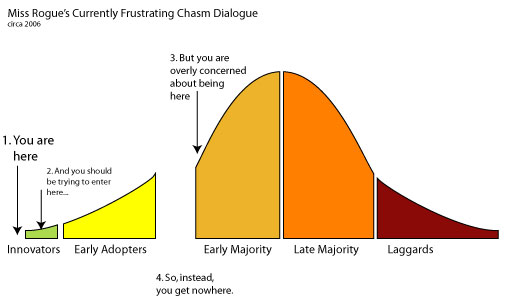There has been a lot of buzz the past 6-8 months about hiring great technical co-founders. The implication seems to be that being a non-technical co-founder is a handicap of sorts and that CEOs buy sandwiches before the product is finished. Apparently coding & building great products is hard, but running the business is easy. Here are some articles:
Why You Can’t Recruit a Technical Cofounder
Quora – Technical Co-Founders
Please, please, please Stop Asking How To Find a Technical Co-Founder
Thoughts On Hiring a Technical Co-Founder
I am a “technical co-founder” at Peek – I code, keep big scale systems up, hire & fire, set dev processes, and all that other technical stuff. So let me tell you about how I got recruited into Peek by Amol Sarva, @amolsarva.
Sell Vaporware
Amol had one VC committed to Peek in our A, and had a letter of intent from Target (yes – www.target.com – that Target) to sell Peeks nation-wide, in-store in the US. The status of the “product” – he had a carved out a wooden model of the Peek (ala Palm)!! And these deals were huge – a $15mm A round with half committed. Target – nation-wide for Christmas 2008!! These days I hear too much crap from “deal guy” founders about finishing product before doing deals. Lame. Be a stud – go sell vaporware. Go get real customers who pay you real money. Go find partners and distributors. I have seen countless, great sales guys in my life sell smoke and mirrors. Why can’t you?

Hire Other Studs
Amol had recruited John Tantum, former President of Virgin Mobile USA, as our chairman. He had an all-star marketing & retail guru lined up. Our advisory team was the president of BlackBoard, SVP strategy at Intuit, and the former head of the FCC. No matter what, I knew I was going to learn and have an awesome experience working with some great folks.
Be Generally Awesome
Amol was an interesting guy in general. He had a PhD in Philosophy from Stanford. He was/is building a new property in Queens. He took a photo that hangs in MoMA. The blog I write on is startupnorth, the “blogs” he writes on are Salon & Business Insider. Being generally impressive is important. The important question here is the Peter Thiel question, why is employee #20 going to come work for you? The weight of the CEO’s personality and accomplishments matter here. Senior guys will want to know the accomplishments of your business as well as the accomplishments of your management team. You have to be generally awesome enough to bring people in if you aren’t one of those super red hot, Twitter-esque companies.
Be Top Amongst Your Peers
Amol, while starting Peek, was mentoring other founders. He was one of the original members of Founders Roundtable. His peers looked to him for advice on starting a company.
Now, I know this is a bit of a love-in of Amol. And it also probably feels like a pretty high bar. All you have to do is go get a PhD, raise $15mm and get a distro deal done with the second largest retailer in the US before you can hire great technical co-founders.
Not quite. The main lesson is this. Forget your technical co-founder and realize that the “product” is one aspect of your business. Potentially an important one (also potentially a complete waste of time you need to pivot off of). You need to start consistently proving that you can make this business successful without having a “heroic engineering, product only” mindset. Can you on a day-in, day-out basis creatively solve the problems of the business such as acquiring customers faster/cheaper, reducing churn, recruiting great folks, financing the company’s goals, having great customer service, delivering everything on-time, getting great advice, navigating treacherous competitive waters, and so on and so forth. Can you relentlessly out-execute with or without the crutch of great product and fabulous engineering? The way you have built the business pre-launch tells me a lot about how you will run the business post-launch.
If you can do stuff like Amol did, you’ll be fine. If you are buying sandwiches… sorry, go find someone else.
I’d love to hear from other founders (technical or not) on how they both built their company pre-launch and how they found their technical co-founder.













